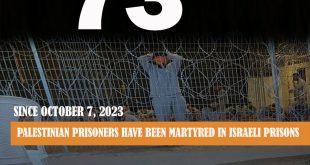Over the course of five days of bombings, terror and uncertainty in the Gaza Strip (“a round of fighting”), Israel killed 30 Palestinians. One-third of those killed did not participate in the fighting. All 10 were killed at the exact same moment, on the first night of the fighting, 9 May 2023, at around 2:00 A.M., when Israel, entirely on its own initiative, launched an air strike on three homes where Islamic Jihad operatives lived with their families:
- In the attack on the home of Tareq ‘Iz a-Din (48), he and his two children, ‘Ali (8) and Mayar (10), were killed. Neighbors living in the apartment above him were also killed: Dr. Jamal Khaswan (52), his wife Mirvat (44) and their son Yusef (19).
- In the attack on the home of Khalil al-Bahtini (44), he, his wife Layla (43), and their daughter Hajar (4) were killed. Two neighbors, who were sisters, were also killed, Daniyah ‘Addas (19) and Iman ‘Addas (17).
- In the attack on the home of Jihad Ghanam (62), he and his wife Wafa (61), were killed.
The three apartments were completely destroyed, along with two others. Two more apartments were damaged.
This was no mistake.
Reporters who attended the military’s secret press briefings after the assault said they were told the officials who ordered the strike knew other people were in the homes and that there was a high chance they would also be killed. For example, it was reported that “the IDF knew uninvolved individuals were present in the vicinity of the three Islamic Jihad commanders and that they were likely to be harmed, but these assessments were taken into account when making the decision to carry out the targeted killings.” Given that the strikes were to be launched in the middle of the night against homes where the families of Islamic Jihad operatives live, this was the logical assumption.
In the past, when civilians were killed in Israeli strikes in Gaza, state officials tried to pass it off as an unexpected outcome – the unfortunate result of some sort of mishap or of bad, partial or obsolete intel, and other such claims. This time around, the masks were off and such claims were not even raised. Instead, Israel maintains the action was legal despite the foreseen results.
Israel’s vain attempts to justify the killings
Israeli justification No. 1: It is merely legal “collateral damage”
One of the claims Israel made was that the strike was legal under international humanitarian law, as it was “proportionate”. The ten innocent people killed were, therefore, simply “collateral damage.” The IDF Spokesperson, for example, said: “We carried out a very targeted operation here with a very clear message and a quality level of extremely localized collateral damage.” Amos Yadlin, the former head of the IDF’s Intelligence Directorate, explained that “the IDF and the ISA showed, through the targeted killing itself, an impressive capacity for precision strikes, in multiple sites simultaneously, with minimum collateral damage (harming uninvolved individuals is unfortunate but proportionate), based on extremely accurate intelligence.”
But this assertion is baseless. According to the principle of proportionality, a strike would be illegal if the “collateral damage” it is expected to inflict on civilians and their property is excessive in relation to the “direct and concrete” military advantage the attacking party can expect to gain from it. The application of this principle is elusive and vague, since there are no set definitions for what might be considered “excessive” harm or what “military advantage” is, nor is it clear how a balance can be struck between such disparate criteria. Given this, when setting out to examine proportionality in a specific case, dispassionate legal analysis is almost impossible, and it is inevitable that a person’s worldview will inform a given interpretation.
Still, as with any other legal principle, not every interpretation can be considered legitimate and there are certainly cases in which the question of whether or not a strike was “proportionate” has an obvious answer. An interpretation entirely divorced from the purpose and spirit of international humanitarian law – such as an interpretation according to which a strike the military launched in the dead of night on family homes is proportionate – is unfounded. If this interpretation is seen as valid, it is difficult to see what point or value is left in international humanitarian law, as it nullifies those protections granted to civilians.
Furthermore, the question of proportionality is relevant only when the strike itself is legal, meaning aimed at a legitimate military objective. Otherwise, the strike would be illegal, regardless of whether or not civilians and their property were harmed. A “legitimate military objective” is defined as one that makes an “effective contribution to military action”, that its total or partial destruction of a legitimate target is one that offers the attacking side a “definite military advantage.”
The attack that night targeted the apartments of three Islamic Jihad operatives. Their homes, and two others belonging to neighbors, were completely destroyed. Can the homes of operatives be considered legitimate military targets according to the above definition? The answer is clearly no, and Israel never tried to claim otherwise. No official said the apartments were the site of any sort of activity that made an “effective contribution to military action” or that striking them offered Israel a “definite military advantage.” Damaging the homes was not the objective of the strike, but an incidental outcome of it, making the entire strike illegal, before even taking into account before the extensive killing it caused.
Israeli justification No. 2: Islamic Jihad operatives are to blame, as they hide behind civilians
Another justification Israeli officials have offered is that Islamic Jihad operatives are responsible, as they choose to hide behind civilians. Thus, for example, IDF Chief of Staff Herzl Halevy said: “If we could, we would have operated without hurting uninvolved people at all, but we must remember – terrorists act from inside the civilian population and put Gazan residents in danger.” This claim is puzzling given that the operatives were asleep in their homes with their families, not engaging in military activity “from inside the civilian population.” But more importantly, it leads to illegal outcomes.
Armed organizations in Gaza do violate international humanitarian law and make no distinction between military and civilian targets. This conflation subverts the most fundamental principle of humanitarian law, namely, reducing harm to civilians as much as possible and keeping them out of combat zones.
According to Israel, this conduct gives it carte blanche to do as it wishes, releasing it from the obligation to obey the law and justifying the extensive harm it inflicts on the civilian population. This interpretation automatically justifies any action Israel wishes to carry out in the Gaza Strip, no matter how horrifying the consequences, absolving it of the duty to keep harm to civilians and their property to a minimum and draining all meaning out of the principle that one party’s failure to follow the rules does not release the other from its obligation to do so.
Israel is the one that chose to fire the missiles that caused death and destruction, and therefore, Israel alone bears the full responsibility for harming Palestinian civilians and their property. Any interpretation that puts the responsibility for this action and its consequences on the Palestinians must be flatly rejected.
Until next time:
During the rounds of fighting that have taken place in the Gaza Strip in recent years, Israel has attacked densely populated residential areas from the air, ground and sea. Thousands of Palestinians have been killed, thousands more have been injured, tens of thousands of homes have been destroyed and hundreds of thousands of people have been left homeless. Entire families have lost their whole world in the blink of an eye, unable to protect their children or themselves inside their own homes. Though patently illegal, this policy is fully backed by Israel’s political, legal and military leadership.
Thus, the air strike on homes in the Gaza Strip on the night of 9 May 2023 is not an exception or an aberration. As in many other cases, it was not undertaken as an act of self-defense, in the face of clear and immediate danger that could not be averted by any other means. On the contrary: Israeli decision-makers chose the timing, the targets and the means. They consciously chose to fire missiles at homes in the middle of the night, while families were asleep in their beds, knowing it was expected that many – including small children – would be killed.
The legal opinions Israel provided to itself, clearing the strike, rely on an erroneous interpretation of international humanitarian law and a morally distorted worldview, both of which must be rejected. As with any crime, there are people who are criminally liable, including the Prime Minister, the Minister of Defense, the Chief of Staff, the Commander of the Air Force and the Military Advocate General.
Not long ago Israeli officials were trying to claim the moral high ground by distancing themselves from illegal acts that blatantly violate International law. Such acts were described as having a “black flag” of flagrant “illegality that pains the eye and outrages the heart” flying over them. But nowadays Israeli decision-makers no longer even bother trying to hide the fact that for them, killing innocent people, including small children, is considered legitimate, not for lack of choice, not in the face of insurmountable, immediate life-threatening danger, but as the high road, as the culmination of a reflective decision-making process, by choice, by will.
btselem

 العربية
العربية עברית
עברית Türkiye
Türkiye Русский
Русский Français
Français We Watch Israeli Violations Specialized website in monitoring and documenting Israeli violations against Palestinians
We Watch Israeli Violations Specialized website in monitoring and documenting Israeli violations against Palestinians






